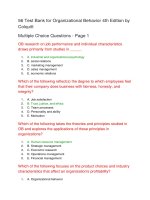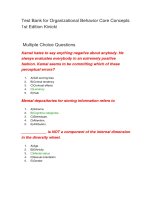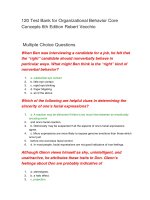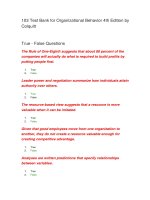Organizational behavior core concepts by kinicki chapter10
Bạn đang xem bản rút gọn của tài liệu. Xem và tải ngay bản đầy đủ của tài liệu tại đây (364.87 KB, 28 trang )
10
Organizational Behavior
core concepts
Power and Politics: How
People Influence One
Another
10-2
McGraw-Hill/Irwin
Organizational Behavior, Core Concepts
Copyright © 2008 by the McGraw-Hill Companies, Inc. All rights reserved.
Learning Objectives
• List influence tactics and outcomes, and
summarize research conclusions about the
effectiveness of the tactics
• Describe five bases of power, and give
examples of how they are related to work
outcomes
• Discuss how to make employee empowerment
succeed
10-3
Learning Objectives
• Define organizational politics, explain what
triggers it, and describe its use in organizations
• Distinguish between favorable and unfavorable
impression management tactics
• Explain how to manage organizational politics
10-4
Generic Influence Tactics
1.
2.
3.
4.
5.
6.
7.
8.
9.
10-5
Rational persuasion
Inspirational appeals
Consultation
Ingratiation
Personal appeals
Exchange
Coalition tactics
Pressure
Legitimating tactics
Three Influence Outcomes
1. Commitment – substantial agreement
followed by initiative and persistence in
pursuit of common goals
2. Compliance – reluctant agreement requiring
subsequent prodding to satisfy minimum
requirements
3. Resistance – stalling, unproductive arguing,
or outright rejection
10-6
Practical Research Insights
• Commitment is more likely when people rely on
strong rational persuasion and do not rely on
pressure and coalition tactics
• Ingratiation (making the boss feel good) can
slightly improve your performance appraisal
results
10-7
Practical Research Insights
• Commitment is more likely when the influence
attempt involves something important and
enjoyable
• Credible people tend to be the most persuasive
• Unfair influence tactics were associated with
greater resistance among employees
10-8
Creating Strategic Allies
•
•
•
•
10-9
Mutual respect
Openness
Trust
Mutual benefit
How to Do a Better Job of Influencing
and Persuading Others
• Reciprocity
– almost universal belief that people should be
paid back for what they do – that one good
turn deserves another
10-10
Social Power and Empowerment
• Social power
– ability to marshal the human, informational,
and material resources to get something
done
10-11
Question?
Which type of power obtains compliance through
formal authority?
A. Reward
B. Coercive
C. Legitimate
D. Referent
10-12
Five Bases of Power
• Reward power
– obtaining compliance with promised or
actual rewards.
• Coercive power
– obtaining compliance through threatened or
actual punishment.
• Legitimate power
– obtaining compliance through formal
authority.
10-13
Five Bases of Power
• Expert power
– obtaining compliance through one’s
knowledge or information.
• Referent power
– obtaining compliance through charisma or
personal attraction.
10-14
Read an article on
organizational power
Employee Empowerment
• Empowerment
– sharing varying degrees of power with lowerlevel employees to better serve the
customer
10-15
Randolph’s Empowerment Model
Figure 10-1
10-16
Domain of Organizational Politics
• Organizational politics
– intentional acts of influence to enhance or
protect the self-interests of individuals or
groups
10-17
Sources of Uncertainty
1.
2.
3.
4.
5.
10-18
Unclear objectives
Vague performance measures
Ill-defined decision processes
Strong individual or group competition
Any type of change
Levels of Political Action in
Organizations
Figure 10-2
10-19
Question?
What is a temporary groupings of people who
actively pursue a single issue?
A. Alliance
B. Coalition
C. Association
D. Federation
10-20
Levels of Political Action
• Coalition
– temporary groupings of people who actively
pursue a single issue
10-21
Political Tactics
•
•
•
•
•
•
•
•
10-22
Attacking or blaming others
Using information as a political tool
Creating a favorable image
Developing a base of support
Praising others
Forming power coalitions with strong allies
Associating with influential people
Creating obligations
Impression Management
• Impression management
– process by which people attempt to control
or manipulate the reactions of others to
images of themselves or their ideas
10-23
Favorable Impression
Management
• Job-focused
– manipulating information about one’s
performance
• Supervisor-focused
– praising and doing favors for one’s
supervisor
• Self-focused
– presenting oneself as a polite and nice
person
10-24
Bad Impressions
Four motives for intentionally looking bad at work:
• Avoidance
• Obtain concrete rewards
• Exit
• Power
10-25









